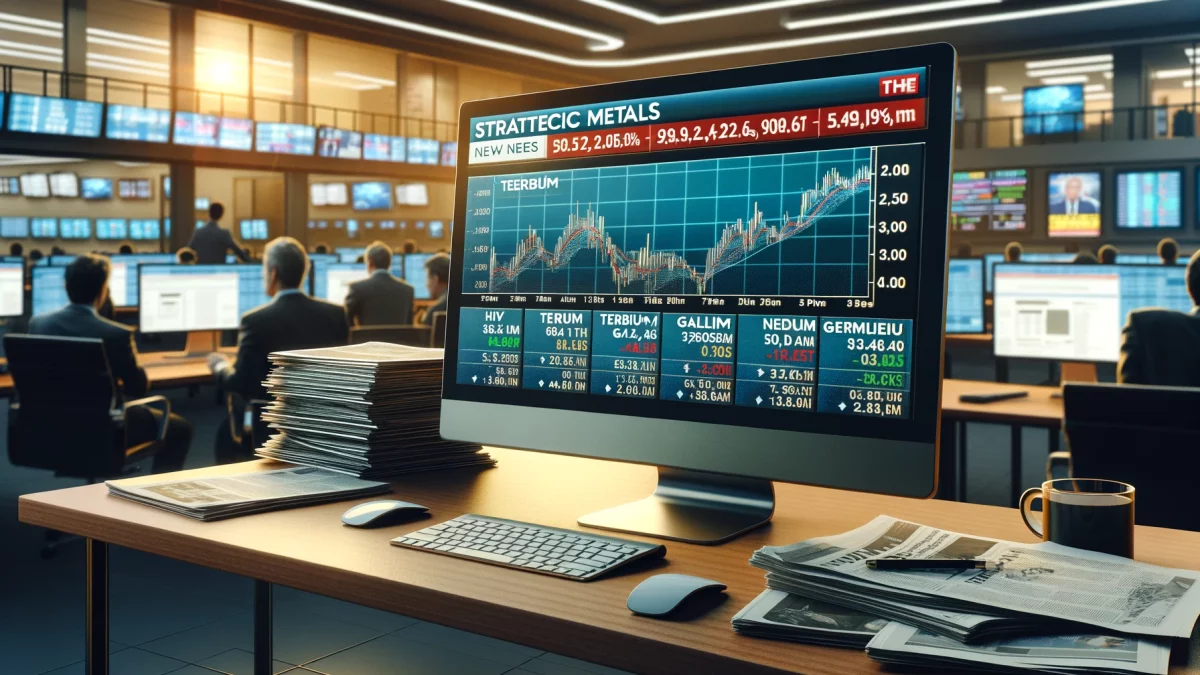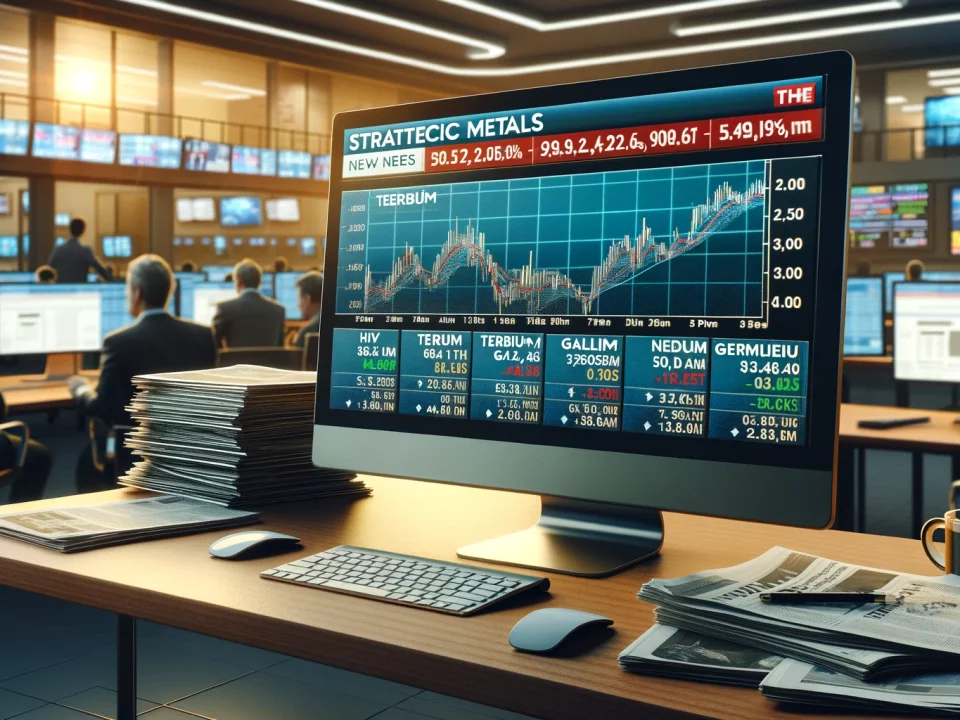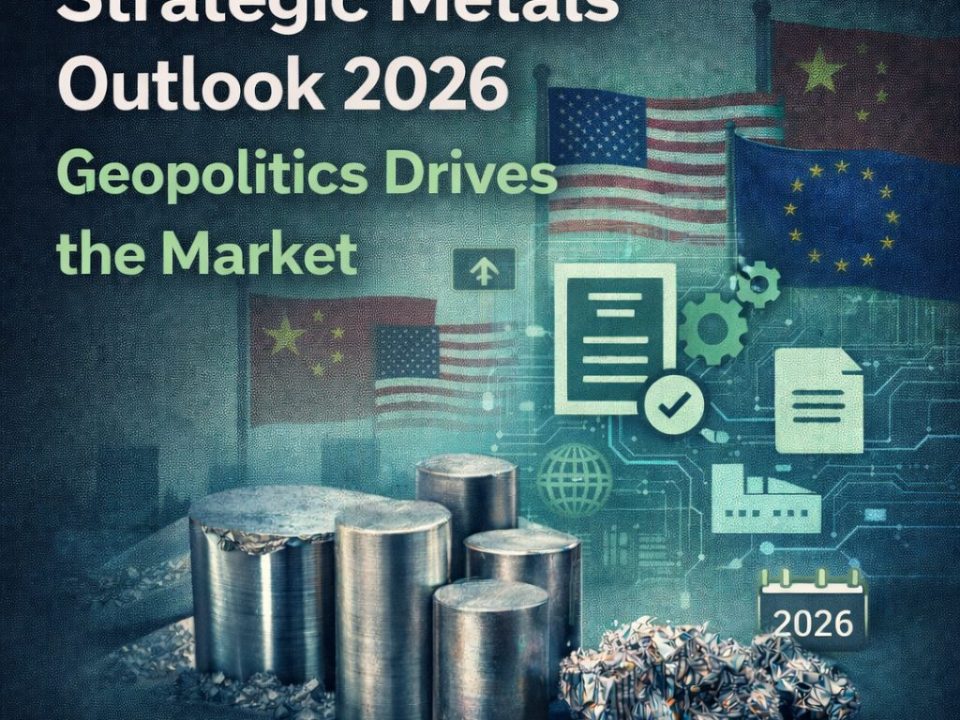
Weekly News Review October 14 – October 20 2024
October 20, 2024
From Crisis to Profit: Why Strategic Metals are Today’s Must-Have Asset
October 30, 2024Welcome to our weekly news review.
UNITED STATES IS WORKING TO ESTABLISH AND INTERNATIONAL MARKETPLACE FOR STRATEGIC METALS:
China’s dominance in the raw materials sector is to be countered. US National Security Advisor Sullivan says progress could be made in the coming weeks.
The United States, in collaboration with allied nations, is working to establish an international marketplace for metals and minerals essential to the energy transition. National Security Advisor Jake Sullivan announced this during an event at the Brookings Institution, a prominent think tank based in Washington.
Sullivan said the critical minerals sector is characterized by extreme price fluctuations, a lack of labor and environmental protections, and a strong concentration on China. The US and its partners must now invest to curb China’s dominance and reduce dependency. He added that progress on a joint marketplace could be seen within the next few weeks.
The measure is part of US President Joe Biden’s industrial strategy to preserve domestic competitiveness. At the same time, challenges such as climate change, increasing geopolitical tensions, vulnerable supply chains, and new technologies like artificial intelligence are to be addressed. Sullivan highlighted that the goal is to preserve open markets while protecting national security with partners and allies.
Creating a joint marketplace has been on the table for some time. For example, European Commission President Ursula von der Leyen called for a kind of raw materials club for ‘like-minded partners’ in 2022. In the field of critical minerals, there are already various cooperation formats between Western countries, such as the Minerals Security Partnership, which aims to unite industrialized nations with resource-rich developing and emerging countries.
Some countries, like Canada, Mexico, and Japan, benefit from the US Inflation Reduction Act through free trade agreements or specific raw materials agreements. However, a similar agreement with the EU has not yet been reached.
UNITED STATES EXPANDS TAX CUTS TO STRATEGIC METALS:
The rules focus mainly on critical mineral processing – pure mining companies will miss out.
The United States is expanding tax cuts under the Inflation Reduction Act to critical mineral production and the manufacturing of some clean energy components. On Thursday, the Department of the Treasury and the Internal Revenue Service published final rules regarding the Advanced Manufacturing Production Credit, a key element of the IRA.
The new rules include a ten percent tax break for applicable products, namely battery, wind, and solar components, and refining critical minerals. Mining costs will only qualify for tax cuts if “certain conditions are met,” the Treasury said, adding on page 14 that “the action of extraction alone does not produce an eligible component.”
This means that companies solely focusing on mining without producing refined products or having them processed abroad will miss out on the tax cuts. In contrast, refiners, including those that purchase raw materials from abroad, will gain access to them. Companies that mine and process in the US will reap the full benefits of the final rules.
While this is still close to the proposed rules published last December, the tax cuts will benefit some miners. They could help motivate other companies to build up domestic refining capacities. The nonprofit organization SAFE, dedicated to diversifying fuel sources and supply chains needed for energy, applauded the final rules, adding that it would be a “game-changer for companies refining, smelting, and processing materials at home.”
The organization believes that the US could compete in the midstream of the supply chain without resource constraints.
UNITED STATES: $430 MILLION TO BOOST CLEAN ENERGY MANUFACTURING IN FORMER COAL MINING COMMUNITIES –
The initiative aims to repurpose the skills of the former coal workforce and leverage their expertise.
The US Department of Energy (DOE) announced Tuesday that it will allocate $430 million to 14 clean energy projects in former coal communities nationwide. The selected companies focus on areas like the production of grid components, batteries, solar goods, and energy efficiency products, as well as recycling. The initiative is part of the Biden-Harris Administration’s Investing in America agenda, intended to strengthen domestic supply chains for clean energy technologies and bolster domestic manufacturing.
Regions in the United States with a long coal history often struggle with the progressing phase-out of fossil fuels in favor of renewable energies. In the Appalachian region alone, more than 37,000 jobs were lost between 2011 and 2011, according to the Appalachian Regional Commission.
The government plans to leverage the workforce’s know-how in these hard-hit communities to bolster the “national security while helping advance forward-facing technologies and revitalize communities across the nation,” Secretary of Energy Jennifer Granholm said. “The transition to America’s clean energy future is being shaped by communities filled with the valuable talent and experience that comes from powering our country for decades.”
Multiple other initiatives and projects aim to tackle the legacy of the coal industry in the US. According to the Federal Mining Dialogue (PDF), an estimated 500,000 abandoned coal mines exist in the country. One program seeking to give these mines a second life is IRENES, which seeks to recover critical minerals like rare earth elements from residues and other waste from coal mines in Illinois.
Charles Bopp, the project’s co-principal investigator, phrased it similarly to Graham, saying that the waste of the last industrial revolution would fuel the next one.
CHINA EXPORTS MORE GERMANIUM LESS GALLIUM IN SEPTEMBER:
The latest figures from the Chinese customs authority show that after two strong months, the export of gallium from China significantly declined in September. Last month, 6,070 kilos of the metal essential for numerous high-tech applications were exported, with Germany being the leading destination.
“For germanium, there was an increase again after a decline in August. Since August 2023, both metals have been subject to export restrictions in China, which the country has justified by citing national security concerns. As dual-use goods, they can be used for civilian and military purposes.”
CHINA AND TURKEY TO JOIN FORCES FOR STRATEGIC METALS:
The two countries will explore cooperation opportunities in Turkish critical mineral projects.
China and the Republic of Türkiye signed a Memorandum of Understanding (MoU) to cooperate in all areas related to mining with a focus on critical minerals. The deal was inked last week in China by Turkish energy and resource minister Alparslan Bayraktar and his Chinese counterpart Wang Guanghuatar.
Under the agreement, the two sides seek to expand their partnership in the mining industry and explore cooperation opportunities in Turkish critical mineral projects.
Bayraktar’s visit to the People’s Republic was already announced last month when officials from the two countries discussed possible cooperation in the field. Bloomberg then reported that the Ankara government sought to make mining projects within its borders more appealing to foreign investors, especially Chinese.
Turkey is the world’s largest producer of boron (PDF), a critical mineral mainly used to produce chemical compounds. The country also mines other critical minerals, such as feldspar and cobalt. In 2022, Turkey made headlines by announcing the discovery of the world’s second-largest deposit of rare earths near the northwestern city of Eskisehir, with a reported 694 million tons of contained material. However, analysts have repeatedly questioned the resource estimations and the quality of the contained raw materials.
AUSTRALIA: GOVERNMENT GETS BEHIND AUTONOMOUS MINING AND OPTIMIZED WIND ENERGY –
The government supports projects to improve domestic competitiveness, productivity, and sustainability.
The Australian government seeks to support the scaling up of domestic innovations with more than $36 million (AUS$55 million). The funding is allocated to various projects in strategic sectors such as critical minerals, renewable energy, medicine, and healthcare. The support is part of the 16th round of Cooperative Research Centres Projects (CRC-P).
This program brings together science and industry to enhance Australian industry’s competitiveness, productivity, and sustainability.
Among the selected projects is a newly developed membrane technology for separating iron, aluminum, and other metals, designed by CPC Engineering, Impact Minerals, and Edith Cowan University. The goal is to reduce waste while also lowering costs in mineral processing.
Another joint project focuses on the storage and, thus, the facilitated export of hydrogen using nanoporous materials. Additionally, projects for developing a platform for digitizing and automating mining, as well as two initiatives for optimizing offshore wind turbines, will receive funding.
This is not Australia’s first funding initiative for projects in renewable energy and the critical minerals industry. The resource-rich country aims to position itself as an alternative to China’s industry leader for its Western trading partners, especially in producing rare earths. Recently, Australia’s Resources Minister Madeleine King stated that promoting the sector is a national priority, but foreign investments are also needed.
AUSTRALIA: ILUKA RESOURCES REPORT, LESS PRODUCTION, NO UPDATE ON RARE EARTH REFINERY –
The mineral sands miner posted financial results for the third quarter.
Australian mineral sands miner Iluka Resources posted financial results for the third quarter on Tuesday, showing less production at its facilities while providing only a minor update regarding the Eneabba rare earth refinery. In the past quarter, zircon, rutile, and synthetic rutile production dropped to 138,000 tons, down roughly 17 percent compared to last year. Iluka cites lower-grade ore processing as the reason for the decline in production. In terms of sales, the company reported an overall revenue decline of four percent for its product. Iluka said that a subdued ceramics demand in China weighed on sales, while zircon demand in Europe remained stable. However, the recently announced Chinese stimulus measures could have positive effects in the coming year.
In the report (PDF), Iluka gave no definitive update regarding the planned Eneabba rare earth refinery. However, the company announced it would provide an updated project report in the year’s second half. The facility is set to become Australia’s first fully integrated refinery for producing separated rare earth oxides. Iluka has repeatedly revised the cost estimations upward.
AUSTRALIA: SEEKS TO DEEPEN STRATEGIC METALS TIES WITH JAPAN –
Resource Minister Madeleine King visited Australia’s second-largest trading partner this week.
Australia’s resources Minister, Madeleine King, will visit Japan this week to deepen ties between the two countries, mainly in the resource sector. According to a media statement, King will talk with high-ranking Japanese executives and deliver a speech at a joint business conference in Nagoya. Japan is Australia’s second-largest trading partner, with two-way trade worth more than $80 billion (AUS$120 billion) in 2023. In comparison, China ranked number one with almost triple the amount. While Australia mainly exports iron ore, coal, and aluminum to Japan, King highlighted the global energy transition’s investment opportunities and the required critical minerals.
Australia has vast resources. With the Future Made in Australia Act, the country seeks to unlock the potential, strengthen domestic manufacturing, and promote key industries, including the critical minerals sector. The over $15 billion funding initiative passed Parliament and will move to the Senate for debate in the coming months. With the act, the government hopes to catalyze private-sector investment and international partnerships.
Australia and Japan have collaborated in the field since 2022 under the Japan-Australia Critical Minerals Partnership. During her last visit to Asia in January, King met with trade ministers from Japan and South Korea and reinforced Australia’s role as a “stable and reliable export partner.” She also courted Japanese and South Korean investments into Australia’s critical minerals sector.
MEXICO: TAX INCENTIVES BEING CONSIDERED TO ATTRACT FOREIGN MANUFACTURERS OF COMPUTER CHIPS, BATTERIES AND ELECTRIC VEHICLES –
The country hopes to produce goods locally that are currently imported from Asia.
The Mexican government mulls tax credits to attract foreign companies to the country, Deputy Foreign Trade Minister Luis Rosendo Gutiérrez Romano told Reuters in an interview. The measure would specifically target high-tech industries such as electric vehicles, battery or semiconductor manufacturers, and companies within the rare earth sector. “We are seriously analyzing creating tax credit incentive programs very similar to those in the United States and Canada,” Romano said.
Through the Inflation Reduction Act and the Chips and Science Act, the US, under President Joe Biden, has successfully mobilized billions in tax credits, subsidies, and direct investments to support the domestic production of high-tech and clean-tech goods, among other fields. In total, almost one trillion dollars in commitments have been announced by private companies so far, data by the White House shows.
The renaissance of domestic US manufacturing prompted other nations, such as the European Union, to impose similar measures in the past. The state union enacted the Green Deal Industrial Plan to enhance the competitiveness of Europe’s net-zero industry.
Reuters adds that the measures the Mexican government considers could position the country as a manufacturer of goods currently being imported from Asia. The news agency cites a document showing the government in Mexico City has begun working with different companies to assess what products could be replaced by domestic manufacturers.
Despite the possible replacement of Asian goods, Deputy Foreign Trade Minister Romero emphasized that possible incentives would apply to firms from all countries, including Chinese ones. In April, the previous Mexican government had announced it would not give Chinese carmakers such incentives following pressure from the United States.
The US feared Mexico could serve as a “back door” to circumvent tariffs and enter the North American Free Trade Agreement without paying levies. In May, the Biden administration announced import tariffs on Chinese goods, including EVs, batteries, and magnets.
EUROPE: SWEDISH COMPANY LKAB ADVANCES TOWARDS RARE EARTHS AND PHOSPHOROUS EXTRACTION –
The company builds an R&D Center and a Demo Plant in Lulea, Sweden.
State-owned Swedish mining company LKAB has announced the next step towards diversifying its business with critical minerals. The mining company specializing in iron products will invest $75 million in a research and development center and a demonstration plant in the Swedish port town of Lulea. At the facilities, LKAB will focus on extracting and processing phosphorus and rare earth elements from material currently discarded at its iron ore mines.
According to the company, this material has thus far been considered waste but holds vast quantities of critical minerals, which are difficult to recover. With the two facilities, LKAB hopes to utilize more of the material it already mines. The company added that it expects the plants to be operational by the end of 2026.
Once mined, the facilities will use material from LKAB’s mine in Gällivare and eventually from the Per Geijer deposit near Kiruna. According to LKAB, Per Geijer is essentially an iron deposit with high phosphorus concentrations and rare earth elements. The discovery of the rare earth deposit made headlines in early 2023 when it was classified as Europe’s largest. Neighboring Norway and the Fen deposit have since claimed that title.
In August, LKAB submitted applications for three projects to be recognized as strategic under the Critical Raw Materials Act, a legislation with which the European Union aims to become less dependent on imports of critical minerals by ramping up domestic mining, processing, and recycling efforts. Strategic projects benefit from an accelerated approval process. Besides the venture in Lulea, the iron ore mine near Gällivare and the Per Geijer deposit were submitted by LKAB.






